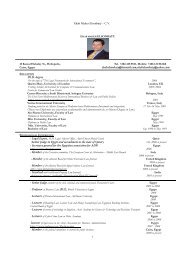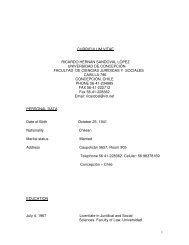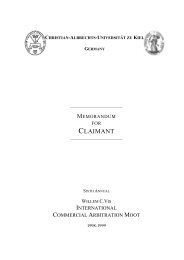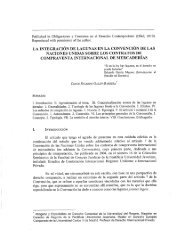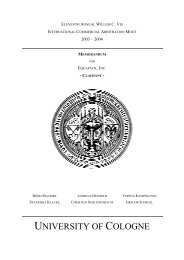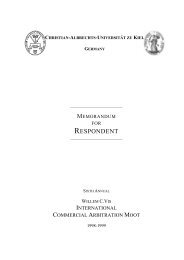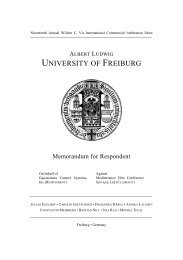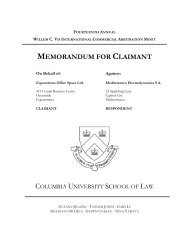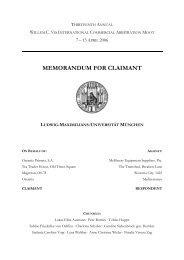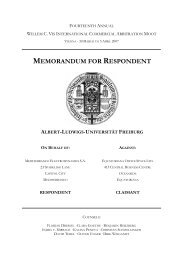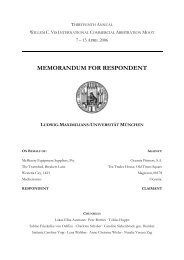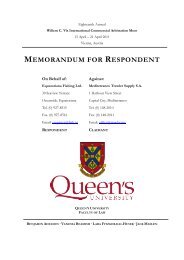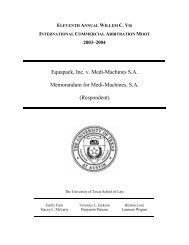MEMORANDUM FOR RESPONDENT - CISG Database
MEMORANDUM FOR RESPONDENT - CISG Database
MEMORANDUM FOR RESPONDENT - CISG Database
Create successful ePaper yourself
Turn your PDF publications into a flip-book with our unique Google optimized e-Paper software.
1. Mr. Hart had apparent authority to amend the Fuse Board Contract.<br />
63. Since the principal-agent relationship arose in Equatoriana, the relevant law of agency<br />
is Articles 1-20 of the CAIS that is enacted there [Procedural Order No. 2, Clarification 16].<br />
Apparent authority is sufficient to bind the principal to the conduct of an agent acting without<br />
or outside the scope of his authority [Article 14(2) CAIS; Bonell on Agency, p. 739]; therefore<br />
it does not matter whether Mr. Hart had actual authority with regard to the Fuse Board<br />
Contract. Under Article 14(2) of the CAIS, “where the conduct of the principal causes the<br />
third party reasonably and in good faith to believe that the agent has authority to act on behalf<br />
of the principal and that the agent is acting within the scope of that authority, the principal<br />
may not invoke against the third party the lack of authority of the agent.” There is no need for<br />
the principal to have intended to confer authority on the agent [Bonell on Agency, p. 740].<br />
64. When Mr. Stiles called the Claimant to discuss the Fuse Board Contract, a secretary<br />
referred him to Mr. Hart in Mr. Konkler’s absence [Statement of Claim, para. 11; Procedural<br />
Order No. 2, Clarification 18]. As the Claimant is a legal entity that must act through its<br />
employees and directors, the secretary’s conduct must be attributed directly to the Claimant.<br />
The Respondent did not know and the Claimant did nothing to suggest that Mr. Hart had not<br />
been given any additional authority in Mr. Konkler’s absence [Procedural Order No. 2,<br />
Clarification 17]. Mr. Hart did not indicate that he had no authority to amend the Fuse Board<br />
Contract. Instead, Mr. Hart even acted as if he had authority to amend the Fuse Board<br />
Contract by asking Mr. Stiles for a recommendation [Claimant’s Exhibit No. 2; Respondent’s<br />
Exhibit No. 1]. Furthermore, Mr. Hart considered his decision an unimportant one<br />
[Claimant’s Exhibit No. 2] and chose to give an immediate answer because of the tight time<br />
pressures on the Claimant’s lease obligations and the fact that it would not be possible to<br />
reach Mr. Konkler that week [Claimant’s Exhibit No. 2].<br />
65. The Respondent reasonably and in good faith believed Mr. Hart was authorized to<br />
make decisions regarding the Fuse Board Contract. When Mr. Stiles called to speak to Mr.<br />
Konkler, it was clearly to discuss the Fuse Board Contract [Respondent’s Exhibit No. 1].<br />
Having been referred to Mr. Hart, it was only reasonable for the Respondent to rely on Mr.<br />
Hart as acting for the Claimant in replacement of Mr. Konkler and with full authority for the<br />
Claimant. It was also reasonable for the Respondent to believe that Mr. Hart was authorized<br />
since objectively it would not make business sense for matters relating to the Fuse Board<br />
23



